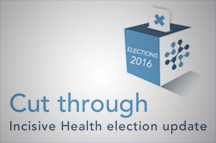 Politicians – especially those with a poll lead – live in fear of ‘events,’ which can disrupt even the most carefully planned narrative. Just ask Hillary Clinton. Previous UK general elections have been disrupted by issues as varied as the funeral pyres of burning livestock caused by foot and mouth disease (2001) to the curiously empty skies caused by an exploding volcano (2010). Theresa May and Jeremy Hunt will hope that the cyberattack which so badly disrupted NHS hospitals on Friday will not be remembered alongside these acts of nature.
Politicians – especially those with a poll lead – live in fear of ‘events,’ which can disrupt even the most carefully planned narrative. Just ask Hillary Clinton. Previous UK general elections have been disrupted by issues as varied as the funeral pyres of burning livestock caused by foot and mouth disease (2001) to the curiously empty skies caused by an exploding volcano (2010). Theresa May and Jeremy Hunt will hope that the cyberattack which so badly disrupted NHS hospitals on Friday will not be remembered alongside these acts of nature.
Twitter has been all atwitter about the role (or absence of role) of Jeremy Hunt in the public response to the cyberattacks. The Health Secretary – a normally surefooted media performer – has been notably absent from the airwaves, leading to some speculation about his future. However the cyberattack response should not necessarily be seen as a precursor to a blue screen of death in Jeremy Hunt’s political career in Richmond House.
The Conservative election strategy is – apart from a couple of set piece interventions during the campaign – to shift attention away from the NHS. The easiest way to achieve this is not to field someone who might be expected to answer detailed questions about it.
Labour and the Liberal Democrats will no doubt continue to seek to link political decisions to the failure to upgrade software. CCHQ will want the cyberattack to be characterised as an ‘operational issue,’ with the blame for any unnecessary vulnerability placed far away from health ministers. The main campaign spokespeople – Phil Hammond, Amber Rudd, Michael Fallon and of course Theresa May – will be left to answer (preferably as few as possible) questions.
Truth be told all parties have a somewhat inglorious record of delivering on NHS IT commitments. Although there will have been some nervous moments this morning as GP land woke up after the weekend, the Conservatives will hope that the worst of the attack is over and that it doesn’t distract attention from their manifesto launch. The appearance of ransomware is, however, a reminder of why politicians live in fear of unforeseen events at election time.












